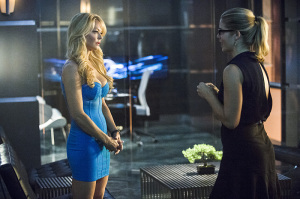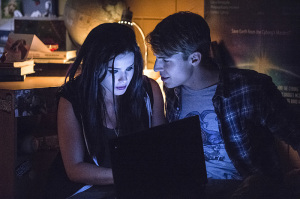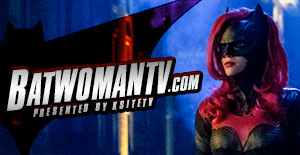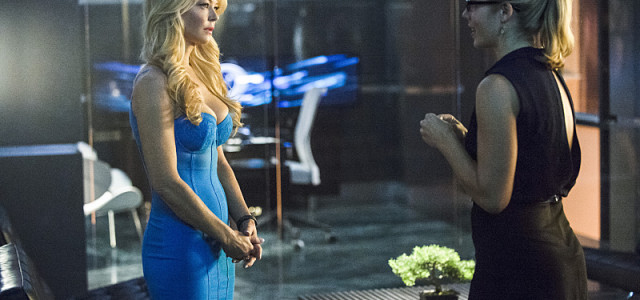
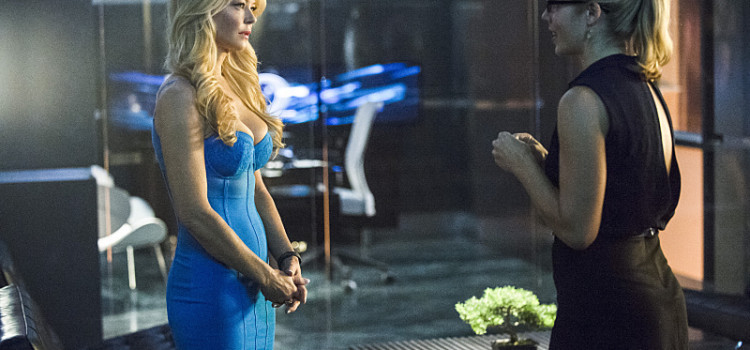
Arrow #3.5: “The Secret Origin of Felicity Smoak” Recap & Review
Recaps & Reviews November 12, 2014 Matt Tucker

Summary: A rather standard story improved by its participants.
If you have not seen this episode yet and do not wish to be spoiled, do not continue reading!
Recap
Ray Palmer visits Felicity’s place to put her on a renewable energy project for the company and both are surprised by a visit from Felicity’s mother, Donna. Oliver checks out Thea’s new place and learns that she got it by using Malcom Merlyn’s money. Power in the city is shut down and a hacker calling himself Brother Eye puts the city on notice that he can do anything to it at any time. Team Arrow goes to work trying to locate the source. The attack causes a panic and a mob tries to get into a bank to get their money. Laurel orders SCPD to send a riot squad, which makes things worse, and Oliver and Roy have to intercede.
Felicity discovers that a hacking program she developed five years ago with her ex-boyfriend Cooper and his roommate is behind Brother Eye’s abilities. Oliver and Roy check out the old roommate, which turns out to be a dead-end. When Oliver pushes her that it could be her ex, Felicity reveals that he was arrested for using the program to hack into the U.S. Department of Education systems and start wiping out student loan debt. Before he was to be sentenced, he hung himself in prison. Emotional, Felicity gets into an argument with her mom. Oliver convinces her to go talk to her mom, who explains that she doesn’t see anything of herself in Felicity and that has made it hard for them to relate to each other.
Felicity and Donna are kidnapped by Brother Eye, who turns out to be Cooper, alive and well. His death was faked so that he could be recruited into the NSA. Now out of the agency, he’s using Felicity’s program to steal money. During a crisis, banks will contact the treasury to send cash reserves to make sure things are covered. Cooper wants Felicity to reroute their GPS to his location. Donna ferociously tries to convince Cooper to let Felicity live. With his attention elsewhere, Felicity is able to use the wifi in a smart watch Ray gave Donna earlier to send a message to Team Arrow where to find them. The Arrow arrives and rescues mother and daughter as Roy and Diggle stop the heist outside.
As Donna says goodbye the next day, Felicity tells her that she got her own fire from her mother. Thea invites Oliver to come live with her, a development Malcolm isn’t too keen on. Roy, who has been having trouble sleeping, awakes from a dream where he killed Sara. Or was it a memory?
For a full recap of this episode, visit our handy episode guide.
Review
Through a large portion of the episode, I found myself wondering why this story was being told. That’s not to dismiss fine work by Emily Bett Rickards and guests Brandon Routh and Charlotte Ross, and any Felicity backstory/history (Felic-tory?) is welcomed with open arms. But why this story and why is Donna Smoak randomly shoehorned in here? It feels incongruent with the rest of everything going on.
That brought on thoughts of these first five episodes of the season. For a show built on a reputation for respecting plot by not treating it precious, tearing through it at blistering speed in a manner that feels organic far more often than not, it’s oddly felt a bit off-pace as of late. It’s up for debate whether this is deliberate or just a slow start to the season as they try to find their story. (With all of the planning that goes into the show, I don’t see this as stumbling around to find themselves.) It’s not that things — relevant things — haven’t happened. It’s just had a feeling of, perhaps, driving in a lower gear.
I dare not say treading water; that’s not it. Just a lot of slower set-up and build-up. (Last week’s “The Magician” might be the lone exception.) Much of this is character-focused, particularly around the impact of losing Sara on each of the characters, which is good. This hour definitely fits into that focus, but one can’t help but feel that they haven’t gotten their hooks into the story just yet.
General tenor of the season aside, I was happy it clicked in the third act that Mama Smoak being there was a calculated move by this week’s antagonist. From the point of view of someone on the outside, it would seem the only personal gambit to make against Felicity would be to threaten her, at least partially, estranged mother. That gave more logic to the whole conceit.
As for the antagonist, Cooper proves serviceable in that Arrow way of having more grounded threats from time to time. Big kudos go to Rickards for doing her best to sell a plot point that was far too obvious to avoid. There was clearly never a doubt that Cooper was the hacker behind the attacks, even with the slight feint about his believed suicide, and Rickards had the thankless job of selling the emotion to ground that deception in the narrative.
It’s interesting that after the Easter Egg with O.M.A.C. used a couple of episodes ago — in the drone plane blueprints that Ray Palmer recovered from Queen Consolidated Applied Sciences — that they would turn to Brother Eye in a different fashion so quickly. One would even have to say that it’s not that coincidental, and no one should be surprised if the Brother Eye ability and/or identity gets repurposed for something else as this season unfolds.
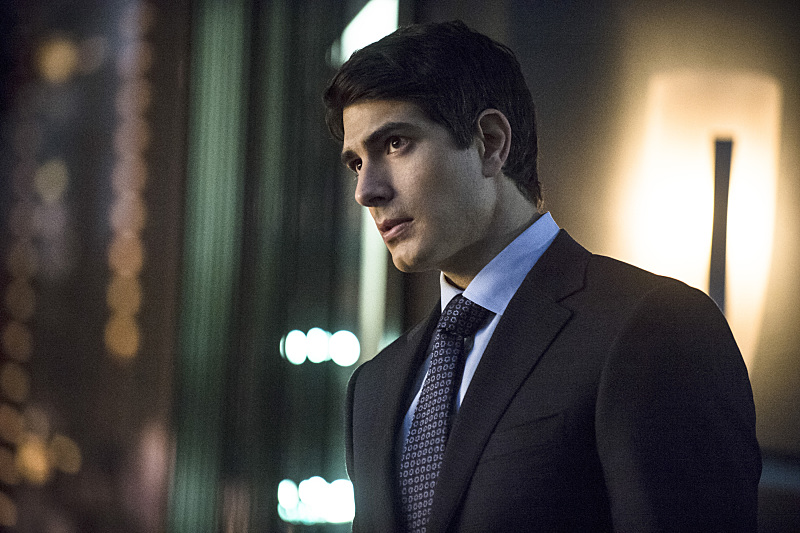
To be honest, my initial reaction upon seeing Brother Eye was a quote of one of my favorite lines from the movie Ghostbusters: “What did you do, Ray?!” After the O.M.A.C. reference, Ray’s ominous interest in Applied Sciences weapons programs, and his geeky enthusiasm for the renewable energy idea throughout the episode, it was hard not to feel that Palmer might have been involved with the cyber attack in some fashion.
Sure, we all know that Ray Palmer is the hero Atom in the comics, but they’ve intentionally played with the idea of his methods and just what he will bring to Starling City on the show. For those unfamiliar, O.M.A.C. is the name for a number of programs throughout the history of the DCU in the comics that use some type of cyborg or drone units powered by an all-seeing satellite referred to as Brother Eye. The thought that Ray could be employing such a tactic to remake the city into Star City didn’t seem like such a stretch.
Alas, B.E. this week is a hacker persona employed by an NSA-trained shadow goon who wanted nothing more than to steal a buttload of money. He also happened to be Felicity’s college boyfriend. The flashbacks this week were pleasant, if a bit diverting. Felicity as goth was a bit too obvious of a choice, but they really wanted to push that physical transformation into the IT Girl we all know and love. Sometimes, though, the easiest choice makes the most sense, and it works for Felicity here. At the same time, it also somewhat reinforces an odd blandness to Felicity’s past that actually doesn’t seem to cry out for more investigation.
Yes, the mystery of Felicity’s deadbeat dad remains and could hold some fascinating story possibilities later on down the line. Yet, aside from a practical reason why this gregarious, intelligent, lovely, charming young woman basically refrains from having a social life that allows her to so easily work with Team Arrow, there really wasn’t much revealed that we don’t already know about her. Even as a goth hacker, she really wasn’t that different of a personality than what we know today. As such an honest presence, there’s something sort of refreshing in that. Felicity is and has always been exactly who she is, and we should take her as is. From a dramatic standpoint, it’s hard to say whether it offered much.
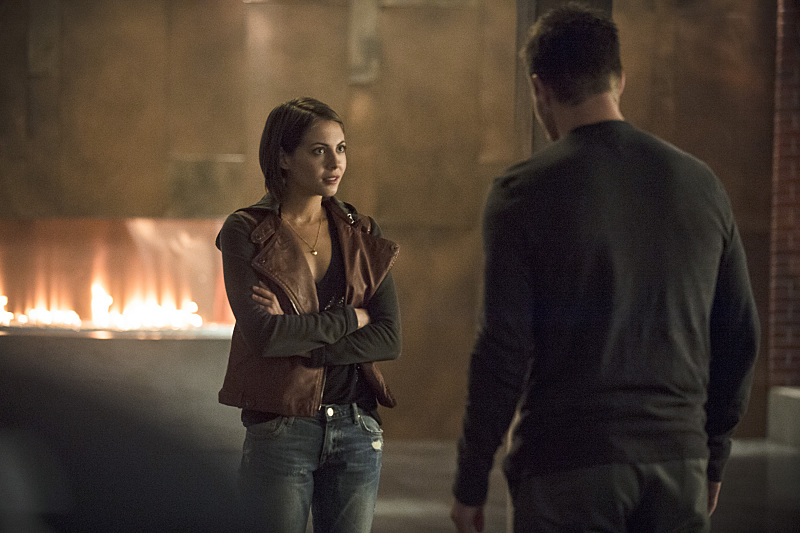
What’s more intriguing is Thea and exactly what’s going on in her mind. That she’s building this relationship with Oliver is a bit odd. Not so much the fact that they are the only true family each has left, even though she has Malcolm, but that she actively knows the perception of her biological father and plays along with it with Oliver.
This suggests that when she decided that the only person who could really offer her what she wanted and needed in the world was Malcolm, her loyalties were officially declared there. There’s an obvious connection between the two now, having spent five months together not only training but getting to know each other in some fashion. She seems to have accepted his deviousness as a natural course of business, and continuing to lie to Oliver about her father does much to cloud her intentions.
On the surface, it would seem Oliver got to her emotionally in Corto Maltese to convince her to come back. There’s, at least, some part of her that genuinely wants to repair and maintain that relationship, even though there’s still anger and resentment over Oliver’s lies to her. Yet, she seems focused on something other than just rebuilding her Starling life and making sure no one ever hurts her again. We know Malcolm has certain intentions for her, but what are hers? Right now, she’s one of the big wildcards on the series.
And we have a lovely new open-spaced set to play with in her new apartment.
Laurel continues to make bad, impulsive choices, like sending the riot squad to deal with the mounting crowd at the bank. The thing I’ve come to appreciate about Laurel is that she’s a spectacularly flawed human being. When the series began, she was sold to us as sort of the most put-together person. She had the believed loss of her sister hanging over her, but it drove her passion to get a law degree and to begin practicing to aid the less fortunate.

We knew Oliver went through a hellish crucible to become the vigilante, but Laurel was like those people we all knew from high school who didn’t have a necessarily clear future but somehow found a hyper-motivation to make something of their lives in the first ten years after graduation. We’ve basically seen her stumble ever since. That hasn’t always been told well, which is why so many seem to be against her, but it’s clear there’s just as much of a journey of pain that leads Laurel to her destiny as Oliver has had.
I also enjoy the fact that there’s no lightswitch moment for her. She’s still stumbling her way to get to when she needs to be, where we’d all like her to be. We thought, following Sara’s death, that finding her way into Ted Grant’s tutelage would be a turning point. Yet, here she is still being motivated by anger and making impulsive choices. Don’t expect that to change any time soon.
Even after being beaten forced her to consider needing training, Laurel’s very much like a scrappy dog that would just as soon be back out there. In fact, even though she opens up and reveals her motivation to Grant, who now has some direction to work with, a Laurel that takes the Black Canary mantle through trial by fire — learning, going out to put into practice, taking all sorts of lumps, coming back to learn further, repeat — seems almost inevitable. The tenacity and ferocity that it gives the character is enjoyable, at least to me, even if it’s sure to be frustrating at times.
“The Secret Origin of Felicity Smoak” feels like something that would take up 2-3 pages in a book rather than an entire issue. It’s rather standard stuff that leads to a rather standard villain. That’s not to say standard is bad, just not as dramatically enticing. The story is elevated by a committed performance by the ever fantastic Rickards and gamely helped by an honest, touching turn by Charlotte Ross and dorky, frenetic fun by Brandon Routh. Still, it seems to follow a pattern so far where everything is setting up to something bigger later on in the season. It’s enjoyable, but it doesn’t feel fully engaged just yet.
Odds & Ends
- Didn’t want to get into it in the review because it was just a tag, but was Roy imaging or remembering himself on that rooftop with Sara?
- Felicity’s a bottle blonde. Who woulda thunk?
- The opening sequence showing the three sparring matches between Oliver and Roy, Laurel and Ted Grant, and Thea and Malcolm, was a great opening made even better by the transition to Felicity’s apartment.
- We’ve talked at length about, and it’s fairly obvious, the influences of Christopher Nolan’s Dark Knight trilogy on the series, but there was some decided non-Nolan Batman DNA throughout the episode. The Brother Eye-O.M.A.C. stuff had a very heavy presence in the Batman comics for a bit, but it’s the Burton films that take a bow here. Palmer’s line about Felicity’s “nice place. Lots of space.” was a clear nod to the 1989 film. It also seemed like he renewable energy plan had shades of Max Schreck’s similar idea in 1992’s Batman Returns. (Though, I’m sure Palmer’s is to genuinely help the city, whereas Schreck’s was to stockpile energy and hold the city ransom over it.)
- Freelancer, a.k.a. John Diggle, gets a mask! He should have that balaclava on-hand for missions far more often.
- “Why didn’t you tell me about this?” This is a line I could do without. Not everyone tells people everything, Oliver. They certainly shouldn’t have their feet held to the coals over it. Felt aggressively unnecessary.
- By contrast, the “I’ve had some experience with that” line about people seeming to come back from the dead was a nice aside.
- Myron Forest, Cooper’s roommate, is named after a scientist in a parallel universe in the comics who was instrumental in developing Brother Eye and Project O.M.A.C.
A SECOND OPINION
by Derek B. Gayle
It’s always fun to see Arrow take a break from its Oliver flashbacks in favor of character-centric ones, and much like Diggle’s spotlight last season, it gives the show an opportunity to mess around with different types of storytelling. For this Felicity-centric tale, we get a modern, punk-y cyber mystery of ghosts from the past, lovers back from the dead, and a tinge of family drama to boot. The results are shaky in terms of that storytelling; this is a fairly messy episode, structurally speaking. The tone whips back and forth between wall-to-wall humor and typical operatic melodrama, and sometimes it wavers between conscious self-parody and total straightforwardness. There are lots of clichés thrown about, especially with Felicity’s relationship with her mom, and the plot twists in Felicity’s backstory are operatic in ways that never really jibed with Felicity’s “normal person” status.
For a character that has functioned as the “normal” one–abnormal as her hacking abilities definitely are–throwing out an epic, convoluted backstory has the potential to ruin the sheen. And it comes dangerously close to being somewhat laughable that Felicity had a boyfriend that faked his death in the NSA and used her computer program to lockdown Starling City. After all, it’s totally acceptable for our costumed heroes to have these wild connections and fights against destiny, but Felicity worked her way into the show by sheer human prowess and personality, not any destiny-soaked comic book origin.
Luckily, “The Secret Origin of Felicity Smoak” only teeters on that edge–probably quite consciously–but never topples over it. Goth Felicity isn’t terribly different from our current Felicity besides the aesthetics, and perhaps a bit more affinity for PDA that college kids tend to have. Her flashback is less of an actual heroic origin and more an example of why she found herself where she was at the beginning of season one. She’s a girl of many talents, but the traumatic imprisonment and death of Cooper surely shut down many of her aspirations to do anything more. Cooper might be wrong about Felicity being the corporate lapdog now, but if he returned two years ago, she’d have only been a lowly IT girl at that corporation–maybe better than a lapdog, but still not using her talents to full effect. As such, her flashback doesn’t so much parallel where Felicity is now as it does lay out her entire arc through the show thus far. Felicity has a lot of talent in her, but she was too afraid to use them until she became an integral member of Team Arrow. Once she did, of course, she flourished as a hero, which this episode makes sure to highlight.
Bringing in Felicity’s mother, who otherwise has nothing to do with the flashback story, also functions to the success of the episode. Charlotte Ross brings a lot of punch to the Donna Smoak character, even in the face of some of the most clichéd dialogue and beats in the episode. Donna is ditzy—and charming because of it—but Ross never makes her completely dimwitted, making sure there’s still the slightest tinge of truth in what she says and how she carries herself. That makes the “revelatory” (but totally predictable) moments where Donna defends her daughter and shows insight feel more organic than they were written. This episode would not be nearly as successful without its actors, as Ross and, of course, Emily Bett Rickards charm up the place and nail everything their given. With Felicity facing both her mom and her ex, the emotional core—and emotional punch Rickards always makes—totally saves this from feeling too melodramatic.
The only questionable parts are anything not related to Felicity, really. Laurel’s DA advancement and riot-starting are notable missteps in what’s been an otherwise solid arc for her this season. It makes sense, kind of, in that it plays into her rage problems, but the derailment of her progress doesn’t seem worth it in the end—she still ends up right back with Ted Grant where she started, after all. And then there’s the reveal of Sara’s killer at the end—both shocking in that it’s Roy, and that the reveal happened so early. It’s so out of the blue that it’s hard to grasp where the show could be going with this, but suggesting that her murder was unconscious (and presumably has something to do with Roy’s Mirakuru stint last year) leads to a wealth of ambiguity to explore. It’s hard to tell where it’s going, and like Sara’s death in “The Calm,” it’s definitely tacked on specifically to be a shocker to lead into next week.
But overall, “The Secret Origin of Felicity Smoak” is just a ton of fun, and that makes a big difference when the plot isn’t all that unique. Like what the character of Felicity brings herself, much of this episode is warm and packed with humor and lightness. Even beyond Felicity, little bits—like the rendering of the Brother Eye virus, and generally any scene with Ray Palmer—is the sort of comic book fun that this show handles perfectly. So while the operatic storyline isn’t as well-hidden as it often is in Arrow, it doesn’t matter all that much, because it yields an incredibly entertaining hour that never lags.
Matt Tucker Editor/Senior Writer/Reviewer
Matt Tucker is a stage and film actor, writer, Seattleite, comics nerd, sports fan, and aspiring person. Someday, he’ll be a real boy. He's an editor and senior writer for KSiteTV network (GreenArrowTV, DaredevilTV) and the sports blogs Sonics Rising and Cascadia Sports Network. Follow him on Twitter at @MattBCTucker or @TuckerOnSports
Arrow Reunion Picket Set For August 11
News Aug 4, 2023
Stephen Amell Is Returning To The Arrowverse!
News Jan 8, 2023
Happy Arrowversary!
News Oct 10, 2022
Mia Queen Returns For The CW’s “Armageddon”
News Aug 25, 2021
Arrow Season 8 Blu-ray & DVD Coming April 28
News Feb 5, 2020
End of an Arrow: Thoughts on the Series & Finale
News Jan 28, 2020

